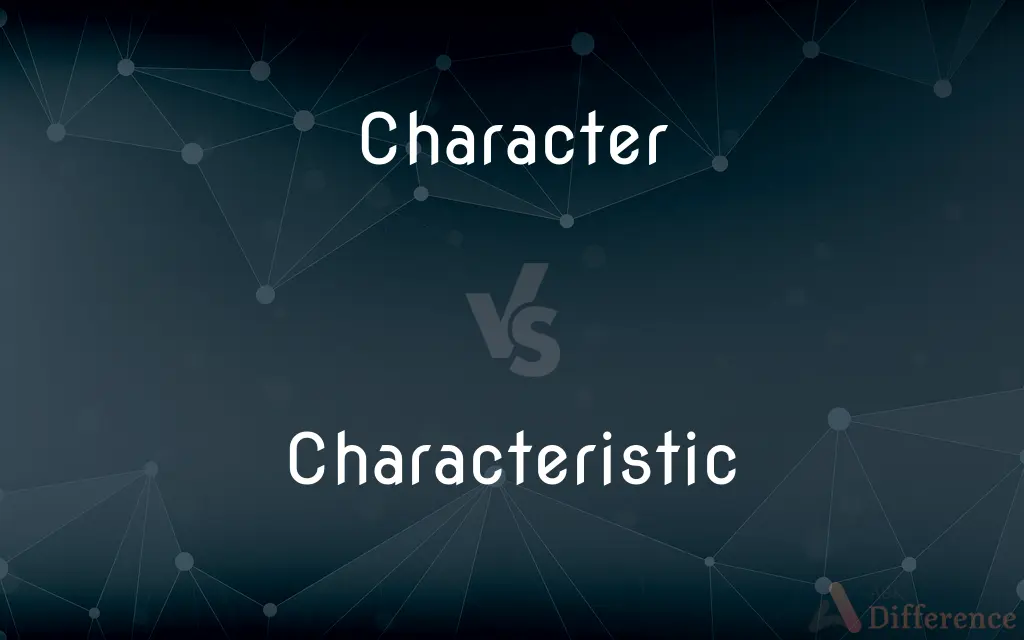Character vs. Characteristic — What's the Difference?
By Fiza Rafique & Urooj Arif — Updated on April 2, 2024
Character refers to the set of qualities that define an individual's moral and ethical actions and reactions, whereas a characteristic is a distinguishing feature or quality of a person, object, or phenomenon.

Difference Between Character and Characteristic
Table of Contents
ADVERTISEMENT
Key Differences
Character encompasses the moral and ethical traits of an individual, such as honesty, integrity, and compassion, which influence their behavior and interactions. These traits are often assessed collectively to judge a person's moral and ethical standing in society. On the other hand, a characteristic can refer to any notable feature or quality that helps to identify a person, object, or concept, such as physical attributes, behaviors, or patterns.
While character traits are inherently linked to an individual's choices and moral actions, characteristics can be neutral and encompass a wide range of observable qualities, including those unrelated to morality or ethics. For example, blue eyes are a characteristic, not a character trait. This distinction highlights the broader applicability of characteristics as opposed to the more focused and evaluative nature of character.
Character is developed over time, influenced by experiences, education, and personal reflection, signifying a dynamic aspect of an individual's personality that can evolve. Conversely, some characteristics are innate and unchanging, such as genetic traits, though others, like skills or knowledge, can be acquired and developed.
In literature and storytelling, character development is crucial for creating relatable and dynamic characters whose moral complexities and growth engage the audience. Characteristics, while also important, serve more to distinguish characters from one another and to add detail to the narrative, such as a character's physical descriptions or habitual behaviors.
Comparison Chart
Definition
The set of moral and ethical qualities defining an individual.
A distinguishing feature or quality of a person, object, or phenomenon.
ADVERTISEMENT
Scope
Pertains to moral and ethical dimensions.
Encompasses a wide range of features, including physical, behavioral, and abstract qualities.
Changeability
Can evolve over time through personal development.
Can be both innate and unchanging, or acquired and developed.
Role in Literature
Central to character development and narrative engagement.
Used to distinguish and detail characters or settings.
Context of Discussion
Often related to personal and professional development, ethics.
Discussed in various contexts, including biology, sociology, and personal identification.
Compare with Definitions
Character
The aggregate of features and traits that form the individual nature of a person or thing.
Her strong character is evident in her dedication to volunteering.
Characteristic
Can refer to physical attributes, behaviors, or patterns.
Her laughter is so unique; it’s a characteristic feature of hers.
Character
Evaluated collectively to judge an individual's ethical standing.
Employers often consider character during the hiring process.
Characteristic
Can be inherent or acquired, static or dynamic.
Being detail-oriented is a characteristic that has helped him in his career.
Character
Refers to ethical and moral qualities like integrity, honesty, and compassion.
A person of good character is respected in their community.
Characteristic
In science, characteristics can define species, elements, or phenomena.
The ability to conduct electricity is a characteristic of metals.
Character
Character shapes how individuals respond to challenges and make decisions.
His character was tested during the crisis, and he acted with integrity.
Characteristic
Not necessarily tied to morality or ethics.
Blue eyes are a characteristic, not a sign of character.
Character
Can be developed and strengthened over time through experiences and reflection.
Leadership roles in school can help students develop their character.
Characteristic
Typical of a particular person, place, or thing
He began with a characteristic attack on extremism
Character
The combination of mental characteristics and behavior that distinguishes a person or group.
Characteristic
A feature or quality belonging typically to a person, place, or thing and serving to identify them
Certain defining characteristics of the school emerge from the study
Character
The distinguishing nature of something.
Characteristic
The whole number or integral part of a logarithm, which gives the order of magnitude of the original number.
Character
Moral strength; integrity
An educational program designed to develop character.
Characteristic
Being a feature that helps to distinguish a person or thing; distinctive
Heard my friend's characteristic laugh.
The stripes that are characteristic of the zebra.
Character
Public estimation of someone; reputation
Personal attacks that damaged her character.
Characteristic
A feature that helps to identify, tell apart, or describe recognizably; a distinguishing mark or trait.
Character
(Biology) A structure, function, or attribute of an organism, influenced by genetic, environmental, and developmental factors.
Characteristic
(Mathematics) The integral part of a logarithm as distinguished from the mantissa
The characteristic of the logarithm 6.3214 is 6.
Character
A person considered as having a specific quality or attribute
"Being a man of the world and a public character, [he] took everything as a matter of course" (George Eliot).
Characteristic
(Mathematics) The least number of times the multiplicative identity in a ring needs to be added to itself to reach the additive identity, or, if the additive identity is never reached, zero. The integers have a characteristic of zero; the integers modulo 12 have a characteristic of 12.
Character
A person considered funny or eccentric
Catcalls from some character in the back row.
Characteristic
Being a distinguishing feature of a person or thing.
Character
A person portrayed in an artistic piece, such as a drama or novel.
Characteristic
A distinguishing feature of a person or thing.
Character
A person or animal portrayed with a personality in comics or animation
A cartoon character.
Characteristic
(mathematics) The integer part of a logarithm.
Character
Characterization in fiction or drama
A script that is weak in plot but strong in character.
Characteristic
(nautical) The distinguishing features of a navigational light on a lighthouse etc by which it can be identified (colour, pattern of flashes etc.).
Character
Status or role; capacity
In his character as the father.
Characteristic
For a given field or ring, a natural number that is either the smallest positive number n such that n instances of the multiplicative identity (1) summed together yield the additive identity (0) or, if no such number exists, the number 0.
The characteristic of a field, if non-zero, must be a prime number.
Character
A description of a person's attributes, traits, or abilities.
Characteristic
Pertaining to, or serving to constitute, the character; showing the character, or distinctive qualities or traits, of a person or thing; peculiar; distinctive.
Characteristic clearness of temper.
Character
A formal written statement as to competency and dependability, given by an employer to a former employee; a recommendation.
Characteristic
A distinguishing trait, quality, or property; an element of character; that which characterized.
The characteristics of a true critic.
Character
A mark or symbol used in a writing system.
Characteristic
The integral part (whether positive or negative) of a logarithm.
Character
A Chinese character.
Characteristic
A prominent aspect of something;
The map showed roads and other features
Generosity is one of his best characteristics
Character
One of a set of symbols, such as letters or numbers, that are arranged to express information.
Characteristic
A distinguishing quality
Character
The numerical code representing such a character.
Characteristic
The integer part (positive or negative) of the representation of a logarithm; in the expression log 643 = 2.808 the characteristic is 2
Character
(Mathematics) The trace function of a representation.
Characteristic
Any measurable property of a device measured under closely specified conditions
Character
A style of printing or writing
"Here is the hand and seal of the Duke.
You know the character" (Shakespeare).
Characteristic
Typical or distinctive;
Heard my friend's characteristic laugh
Red and gold are the characteristic colors of autumn
Stripes characteristic of the zebra
Character
A cipher or code for secret writing.
Character
Of or relating to one's character.
Character
Specializing in the interpretation of often minor roles that emphasize fixed personality traits or specific physical characteristics
A character actor.
Character
Of or relating to the interpretation of such roles by an actor
The character part of the hero's devoted mother.
Character
Dedicated to the portrayal of a person with regard to distinguishing psychological or physical features
A character sketch.
Character
To write, print, engrave, or inscribe.
Character
To portray or describe; characterize.
Character
(countable) A being involved in the action of a story.
Character
(countable) A distinguishing feature; characteristic; trait; phene.
A single locus governing the petal colour character was detected on the linkage group A2.
Character
A complex of traits marking a person, group, breed, or type.
A study of the suspect's character and his cast iron alibi ruled him out.
Character
(uncountable) Strength of mind; resolution; independence; individuality; moral strength.
He has a great deal of character.
"You may not like to eat liver," said Calvin's father, "but it builds character."
Character
(countable) A unique or extraordinary individual; a person characterized by peculiar or notable traits, especially charisma.
Julius Caesar is a great historical character.
That bloke is such a character.
Character
(countable) A written or printed symbol, or letter.
Character
Style of writing or printing; handwriting; the particular form of letters used by a person or people.
An inscription in the Runic character
Character
A secret cipher; a way of writing in code.
Character
One of the basic elements making up a text file or string: a code representing a printing character or a control character.
Character
A person or individual, especially one who is unknown.
We saw a shady character slinking out of the office with some papers.
That old guy is a real character.
Character
A complex number representing an element of a finite Abelian group.
Character
(countable) Quality, position, rank, or capacity; quality or conduct with respect to a certain office or duty.
In the miserable character of a slave
In his character as a magistrate
Character
The estimate, individual or general, put upon a person or thing; reputation.
A man's character for truth and veracity
Her actions give her a bad character.
Character
A reference given to a servant, attesting to their behaviour, competence, etc.
Character
Personal appearance.
Character
(obsolete) To write (using characters); to describe.
Character
A distinctive mark; a letter, figure, or symbol.
It were much to be wished that there were throughout the world but one sort of character for each letter to express it to the eye.
Character
Style of writing or printing; handwriting; the peculiar form of letters used by a particular person or people; as, an inscription in the Runic character.
You know the character to be your brother's?
Character
The peculiar quality, or the sum of qualities, by which a person or a thing is distinguished from others; the stamp impressed by nature, education, or habit; that which a person or thing really is; nature; disposition.
The character or that dominion.
Know well each Ancient's proper character;His fable, subject, scope in every page;Religion, Country, genius of his Age.
A man of . . . thoroughly subservient character.
Character
Strength of mind; resolution; independence; individuality; as, he has a great deal of character.
Character
Moral quality; the principles and motives that control the life; as, a man of character; his character saves him from suspicion.
Character
Quality, position, rank, or capacity; quality or conduct with respect to a certain office or duty; as, in the miserable character of a slave; in his character as a magistrate; her character as a daughter.
Character
The estimate, individual or general, put upon a person or thing; reputation; as, a man's character for truth and veracity; to give one a bad character.
This subterraneous passage is much mended since Seneca gave so bad a character of it.
Character
A written statement as to behavior, competency, etc., given to a servant.
Character
A unique or extraordinary individuality; a person characterized by peculiar or notable traits; a person who illustrates certain phases of character; as, Randolph was a character; Cæsar is a great historical character.
Character
One of the persons of a drama or novel.
Character
To engrave; to inscribe.
These trees shall be my books.And in their barks my thoughts I 'll character.
Character
To distinguish by particular marks or traits; to describe; to characterize.
Character
An imaginary person represented in a work of fiction (play or film or story);
She is the main character in the novel
Character
A characteristic property that defines the apparent individual nature of something;
Each town has a quality all its own
The radical character of our demands
Character
The inherent complex of attributes that determine a persons moral and ethical actions and reactions;
Education has for its object the formation of character
Character
An actor's portrayal of someone in a play;
She played the part of Desdemona
Character
A person of a specified kind (usually with many eccentricities);
A real character
A strange character
A friendly eccentric
The capable type
A mental case
Character
Good repute;
He is a man of character
Character
A formal recommendation by a former employer to a potential future employer describing the person's qualifications and dependability;
Requests for character references are all to often answered evasively
Character
A written symbol that is used to represent speech;
The Greek alphabet has 24 characters
Character
Engrave or inscribe characters on
Common Curiosities
Are characteristics always visible?
No, characteristics can be both visible (like physical traits) and invisible (like behavioral patterns or skills).
Can a characteristic be a part of one's character?
While characteristics can describe aspects of a person, they are not typically considered part of one's moral or ethical character unless they directly influence moral behavior.
What distinguishes character from characteristic?
Character refers to moral and ethical qualities, while characteristics are distinguishing features or qualities that can be moral, physical, or behavioral.
How does character affect one's actions?
Character influences an individual's decisions and actions, especially in moral and ethical contexts.
How are characters developed in literature?
Through narrative challenges, growth, and experiences that reveal and test their moral and ethical qualities.
How do characteristics affect interpersonal relationships?
Personal characteristics can influence compatibility, attraction, and the dynamics of interpersonal relationships.
Can the same characteristic have different meanings in different contexts?
Yes, the significance of a characteristic can vary widely depending on the context in which it is observed or discussed.
How is character assessed?
Through observations of an individual's actions, decisions, and how they handle moral and ethical dilemmas.
Can character change over time?
Yes, character can evolve through personal experiences, reflection, and development.
What role do characteristics play in personal identity?
Characteristics contribute to personal identity by distinguishing individuals from one another.
Is character more important than characteristics?
Importance varies depending on context; in moral or ethical discussions, character may be deemed more important, whereas in identification or differentiation, characteristics may take precedence.
Can animals have character?
Animals can exhibit behaviors that humans interpret as character traits, such as loyalty or aggression, but interpretations vary.
Are all characteristics inherited?
Not all; some are inherited genetically, while others are acquired or developed through experience.
Can a characteristic influence one's character?
While characteristics are distinct from character, certain traits, like resilience or empathy, can influence how a person's character is perceived and developed.
What is the significance of character in professional settings?
Character is crucial in professional settings as it influences trustworthiness, leadership qualities, and ethical behavior.
Share Your Discovery

Previous Comparison
Lid vs. Cap
Next Comparison
Volcano vs. MountainAuthor Spotlight
Written by
Fiza RafiqueFiza Rafique is a skilled content writer at AskDifference.com, where she meticulously refines and enhances written pieces. Drawing from her vast editorial expertise, Fiza ensures clarity, accuracy, and precision in every article. Passionate about language, she continually seeks to elevate the quality of content for readers worldwide.
Co-written by
Urooj ArifUrooj is a skilled content writer at Ask Difference, known for her exceptional ability to simplify complex topics into engaging and informative content. With a passion for research and a flair for clear, concise writing, she consistently delivers articles that resonate with our diverse audience.














































